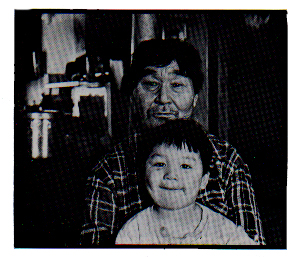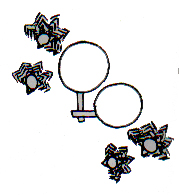 This collection of student work is from Frank Keim's classes. He wants to share these works for others to use as an example of culturally-based curriculum and documentation. These documents have been OCR-scanned and are available for educational use only.
This collection of student work is from Frank Keim's classes. He wants to share these works for others to use as an example of culturally-based curriculum and documentation. These documents have been OCR-scanned and are available for educational use only.Special | A | B | C | D | E | F | G | H | I | J | K | L | M | N | O
P | Q | R | S | T | U | V | W | X | Y | Z | ALL
Kirt Bell:
Kirt Bell Kayaking "In the old days they used to use kayaks to travel in the ocean. Every man had a kayak in those days. If he didn't have a kayak he would be stuck for hunting or fishing in the bay. The men would travel anywhere, not only out on the bay but upriver too. They would also travel over ponds and lakes to hunt. The men used to go out hunting down on the open ocean during the fall time when the days were not windy. They would wake up very early, just before daylight, and they used to stay down there for a long time. They never used a gun either. They only had a long harpoon ("taprriiluq") with a long seal skin rope attached to it called "aiyaaqun". The harpoon head was sharp with a barbed side. "When it is foggy on the sea it is worse than on the land and it is really hard to know which way to go to get back to land. If the hunter gets confused or lost on the ocean he will have to look for flying birds, especially Loons, because they fly by following the coast. If he is still confused he should paddle toward the ice and circle it and look at the water around the ice. He also might look toward the sun to find small specks like dandruff. These appear under the sun and because they move toward the ocean he would start paddling in the opposite direction. Circling the ice he would also look for the dandruff-like things in the water. Those things don't go toward the land, only toward the sea. "One time our great grandfather, whose name was "Qillerravialeq", was lost out in the ocean. He got confused and he thought he was paddling toward the land. There was a lot of ice in the ocean. He was paddling all afternoon until he came to another kayak, and that kayak was at the edge of the ice. He was glad to see a person out in the sea, and he paddled toward him. The person was only a young man, just growing a mustache. He was sitting inside of his kayak. My great grandfather had never seen this young man before. And right behind his kayak he saw some smoke and a cooking pot. When he got out of his kayak the young man asked him why he was paddling around here and told him that he wasn't going toward the land but in the wrong direction. Then my great grandfather asked him if he had a dipper. Men always carried a dipper with them when they went out in their kayaks. They wore a seal gut raincoat tied around the rim of the kayak and if the water got heavy around their waist they would use this wooden dipper to dip the water out of their raincoat. The young man gave him his dipper and told him to go to the pot and drink some soup. When my great grandfather went up to the boiling pot he saw only one tomcod in it. It was already cooked so he dipped some soup out and drank it. He looked at the pot again but there was no firewood -- only lichens for firewood. The soup was warm though and it tasted really good. Then the young man told my great grandfather to go in a certain direction so that he would head for land. When great grandfather got into his kayak the young man told him, "Now go straight toward the land until you reach your destination. A long time ago when I was small you used to really care for me and now I care for you by letting you drink some of my soup. You might think I'm lying, so paddle for a short distance and then look back at me." When grandfather left he was relieved from hunger and felt stronger paddling. Then he looked back as he had been told, and all he saw was a seagull standing at the edge of the ice making noise at him, and this made him think to himself: "That seagull is the young man who let me drink some of his soup and didn't let me starve. He cared for me out here in the ocean. But when did I care for him?" He asked himself this, and he finally remembered that when he was young he had had a pet seagull and never had let him go hungry, and when the seagull could fly he freed him. That happened a long time ago when he was young, and he was surprised that his own pet had appeared to him like this out here in the ocean. Then he started on his journey again, and after long hours of paddling he finally reached the land, relieved and glad to be home." "When hunters were kayaking down on the ocean, especially in rough seas, they used to wear a wooden visor tied tightly around their head and over the hood of their seal gut raincoat. If a large wave covered the hunter he would have to stay calm and balanced with his kayak bow-down. His paddle would hold the kayak steady, and coming up out of the wave the visor (and the raincoat tied tightly around the kayak's rim) would save the hunter's life because under the visor there was an air bubble to breathe from. If the wind and seas were really rough then the hunter would just pull out on an ice floe and drift. "These are stories by old men who would tell them in the men's house ("qaygiq") long ago.
interview by Francis Bell Don't Be Lazy
"These two parents had been taking care of a certain child since it was born. They fed him every day and hunted for food for him. These two parents took care of him, hoping he'd help them both the same way they helped him. Then his dad asked him to watch the older men do things like hunting for seal and walrus, and fishing. His parents told him not to oversleep in the mornings because it would make him lazy and a poor hunter. They taught him to please his parents because they had hunted and cooked for him. In the same way he then had to start going hunting and getting greens for them." "These days young people and even some older people are lazy and don't go hunting anymore. They don't cook or help their parents either. They only do things their own way. "Getting water and wood is very important for their mother to be able to cook and feed the children and their father. Our parents used to tell us that if we wanted to be like them, then we had to help our family and not be lazy. In the old days in the steam house the old people used to tell us if the front porch was filled with snow, even if it was windy out, we had to clean it out. If the porch or the trails were dirty the men had to clean them up so that in the future they could catch more food for their families. Also, if you had not packed water from the tundra for a long time, the water hole would say to you, "Boy, it's sure been a long time since you packed water." And if you drank from the bucket, the water would not like you and would point a middle finger at you. Also, if a person had some food left over he would store it in a hole in the ground, and so if he were hungry in the future, even though the food was not fresh, it would not make him ugly or skinny." interview by Marita Smith | ||
|





